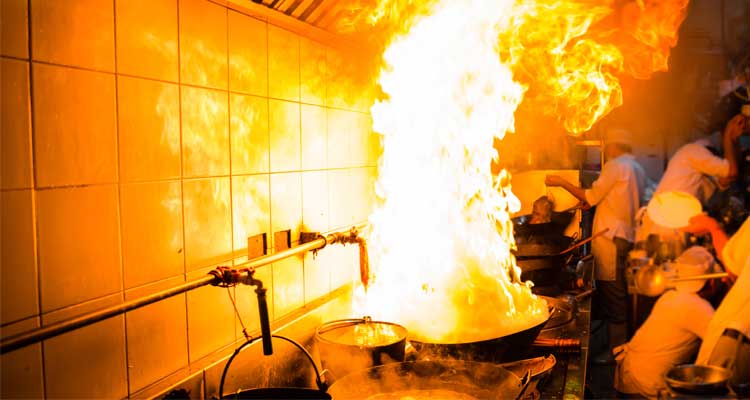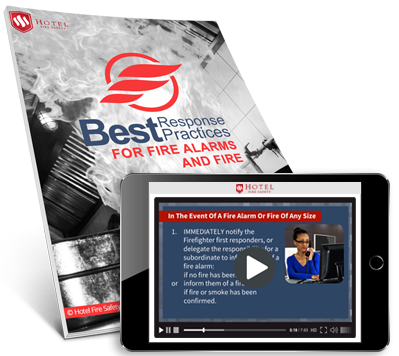Firefighters in large U.S. fire departments with full paid firefighter staff receive fire suppression and rescue training on a weekly basis if not daily when not responding to fire and life safety incidents.
Most large fire departments have firefighting procedures that detail there own duties and responsibilities prescribed to each incident by incident type, type of hazards-including hazards adjacent to the incident, and personnel duties specific to the type of fire truck and responsibilities by the order of fire truck arrival.
Rescue and firefighting strategy and procedures are very detailed. Unfortunately, what you may have already noticed is that, whether your hotel has a large full paid professional trained fire department responding or is staffed by some volunteer firefighters, NONE OF THE DEPARTMENTS CREATE PROCEDURES FOR HOTEL OCCUPANTS to perform prior to their arrival.
You may think you already have adequate training procedures, however please hear me out, I really want to help you. Most occupant procedures are left up to the management staff to create. Unfortunately, the efforts are usually unguided or misguided by the unqualified. Some of the unqualified may have firefighting backgrounds but still don’t know what you need to know or do before firefighters arrive. The truth is that most people given this responsibility usually do not have any real knowledge of hotel construction requirements or knowledge of what to expect from your specific hotel building when it is on fire.
The high-rise hotel buildings’ construction and equipment fire safety features, fire and smoke spreading dynamics, and life threatening reactions from the guest whose thoughts are based on their own perceived potential death scenarios, accurate or not, are a small list of factors typically not considered by hotel management or their employees. This is not a slam on hotel management; hotel management and staff usually do not have any fire-science experience or its application to their own specific high-rise hotel.
These factors and their impact in a fire incident are prerequisites to an appropriate plan along with knowledge and understanding of hotel material furnishings the combustible contents, facades, and other hazards with ramifications directly related to fire safety in your hotel. This is where we come to your assistance.
Hotel managers, hotel front desk personnel, building engineers, security personnel (if available), and guest all have different response procedures specific to their incident scenario.
Firefighters presume that everybody including building managers, staff, and occupants all know what the best procedures for response to fire alarms and fire are. Consequently, their expertise and concern is focused on what they have to do when they arrive, not what you need to do before they arrive.
The management and occupant response to fire alarms and fire issue is another field of fire-science between managing building occupancies (before firefighters arrive) and managing rescue and firefighter operations (after firefighters arrive) that has not been well researched to develop appropriate plans and procedures.
Since I created “Staged Evacuation for High-Rise Buildings,” I understand why every part of the procedures are in place and how to apply it to different scenarios to avoid the disastrous fire injuries and fatalities that have occurred most recently. I authored the first published response to fire alarms and fire procedures for employees and occupants of high-rise office buildings, high-rise hospitals, and high-rise hotels. They all became Fire Code Standards required for high-rises in the city of Houston, Texas. The Houston Fire Marshal’s Office became the first city to require my High-Rise Fire Safety Plans and Procedures for all their high-rises with my prescribed training curriculum.
As of 2017, 32 years of creating site-specific “Staged Evacuation” plans, procedures, and training for management and the occupants of high-rise buildings, none of the thousands of buildings I have created plans and procedures training for, worldwide, have had any problems responding perfectly.
I have yet to see any other fire plans, procedures, or training for the occupants that address the specific issues correctly.
I have seen plans and procedures from hotel chains large and small; many today are derivatives of my original writings with important details absent. Details causing inappropriate responses to acts related to terrorism in high-rise buildings and combustible facades put over non-combustible construction.
Details are important to life safety. I have found that “success is in the details” and “you just can’t talk about, plan, or implement successfully what you don’t know, anymore than you can come back from where you haven’t been”.
I still see fires in buildings that I haven’t had the opportunity to help, happening around the world where staged evacuation has been attempted inappropriately. The sad fact is that many injuries and fatalities have occurred in those fires.
This is why we have made the training program accessible online, and are giving you this very helpful managers booklet “Best Response Practices“ FREE! We are hoping to help you make a greater impact in saving lives and property at your hotel by offering an educational membership that provides access to the Hotel Fire Safety training program for all your staff: MODs, engineers, front desk staff, kitchen staff, doorman, security staff and housekeeping with training available in English and Spanish. Hotel Membership includes many free Members Only Resources from the source that created fire and life safety for occupants in the high-rise building industry.
Hotel Fire Response Procedures are a result of decades of personal insight from architectural experience, a twenty-seven year firefighting career, high-rise building construction code research, hundreds of high-rise and mid-rise atrium hotel fire postmortem report research, high-rise building fire code and elevator code, research and developmental writing from concept to governmental jurisdiction adoption, as well as performing the duties as a high-rise building fire inspector for the city of Houston Fire Marshal’s Office. This experience has been instrumental in creating the most exhaustive educational curriculum for your benefit.
We can impact fire and life safety in your hotel just like we have in thousands of high-rise office buildings and high-rise hospitals worldwide.
I hope to be able to share years of insightful knowledge, understanding and experience with your management team and employees soon.
Get the complete video & PDF document here:
Daniel Salazar, a retired city of Houston Firefighter/Captain/Fire Inspector and Fire Safety Consultant with over 40 years of experience. Daniel’s passion to minimize the fire and life safety hazard for the occupants and firefighters in the high-rise industry has been felt. The National Fire Protection Association (NFPA) and most major cities worldwide have adopted “Response To Fire Alarms and Fire Procedures” for high-rise office buildings and high-rise hotels written by Daniel.




